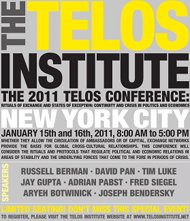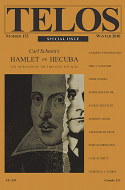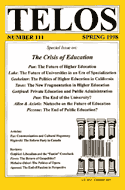By Samuel Tadros · Thursday, February 3, 2011 One week ago, Egypt was a stable authoritarian regime, prospects of change were minimal and every expert in Washington would have betted on the endurance of its regime. Today, Egypt is in a state of chaos. The regime, even after using its mightiest sword is not able to control the country and the streets of Egypt are in a state of utter lawlessness. As the world stands in awe, confusion, and worry at the unfolding events, perhaps it is important to write the evolving story that is happening in Egypt before any reflections can be made on them.
Continue reading →
By Timothy Stacey · Tuesday, February 1, 2011 A longer version of this essay was presented at the 2011 Telos Conference, “Rituals of Exchange and States of Exception: Continuity and Crisis in Politics and Economics.”
 The term “Excellence Critique” connotes a broad array of thinkers, including but not limited to Alisdair MacIntyre, Charles Taylor, Stanley Hauerwas, John Milbank, and Robert Spaemann.[1] While there are clear problems lumping these thinkers together, they share some important qualities. Two such qualities I shall discuss here. The term “Excellence Critique” connotes a broad array of thinkers, including but not limited to Alisdair MacIntyre, Charles Taylor, Stanley Hauerwas, John Milbank, and Robert Spaemann.[1] While there are clear problems lumping these thinkers together, they share some important qualities. Two such qualities I shall discuss here.
First, none of these thinkers deny the successes of liberalism. All agree that liberalism generates the most “wealth” and “freedom” when these terms are measured via monetary success and moral relativism, respectively. Their argument is not one of efficiency; it is one of excellence. Liberalism, according to these thinkers, fails to fully embrace human flourishing. One way of understanding this failure, I will suggest, is via liberalism’s teleological deficit. By teleology I intend a shared, transcendental, and ineffable conception of the good.
Continue reading →
By Omer Moussaly · Monday, January 24, 2011 This text was presented at the 2011 Telos Conference, “Rituals of Exchange and States of Exception: Continuity and Crisis in Politics and Economics.”
Of Power and Princes
 During the sixteenth century, in his famous work The Prince, Machiavelli was already writing about the possibility of a hegemonic and civic form of political power. He described it as a type of principality where consensus was more important than brute force: “we now come to the case where a citizen becomes a prince not through crime or intolerable violence, but by the favour of his fellow-citizens, which may be called a civic principality.”[1] This text was one source of inspiration for the twentieth-century communist thinker Antonio Gramsci, who wrote about the possibility of creating a “Modern Prince.” This “Modern Prince” would take the form of a renewed and hegemonic communist party capable of waging a war of position against bourgeois hegemony. During the sixteenth century, in his famous work The Prince, Machiavelli was already writing about the possibility of a hegemonic and civic form of political power. He described it as a type of principality where consensus was more important than brute force: “we now come to the case where a citizen becomes a prince not through crime or intolerable violence, but by the favour of his fellow-citizens, which may be called a civic principality.”[1] This text was one source of inspiration for the twentieth-century communist thinker Antonio Gramsci, who wrote about the possibility of creating a “Modern Prince.” This “Modern Prince” would take the form of a renewed and hegemonic communist party capable of waging a war of position against bourgeois hegemony.
Continue reading →
By Telos Press · Thursday, January 13, 2011 Drew Daniel’s “‘Neither Simple Allusions Nor True Mirrorings’: Seeing Double with Carl Schmitt” appears in Telos 153 (Winter 2010). Read the full version at TELOS Online website.
 In response to recent criticisms of Schmitt’s argument as “tendentious” and symptomatic, this essay seeks to perform a reparative reading of the central claim of Hamlet or Hecuba for a substantial resemblance between the events within Shakespeare’s play and the murky circumstances surrounding the death of King James’s father, Lord Darnley. First, the historical archive surrounding Lord Darnley’s death is sounded for evidence that might support Schmitt’s claim and illuminate unresolved questions within the plot of Hamlet (in particular, the mysterious “sins” referred to by the Ghost). Secondly, the archive of James’s own published writings on sovereignty, demonology, and witchcraft are placed into relation with Jean Bodin’s similar writings, and brought to bear upon Schmitt’s reading of Shakespeare’s ghost scenes. The cruxes within Shakespeare’s play and Schmitt’s text about the ghost scene (“spirit of health” or “goblin damned”? Catholic or Protestant?) illuminate the relationship between sovereignty and demonology in early modern England: the two discourses are linked by the attempt to establish the divine status of sovereignty and the corresponding subordination of demons and ghosts to theologically established limits and laws. Departing from Schmitt’s initial arguments, this essay extends them in order to illuminate the political-theological terrain within which Hamlet functions. In response to recent criticisms of Schmitt’s argument as “tendentious” and symptomatic, this essay seeks to perform a reparative reading of the central claim of Hamlet or Hecuba for a substantial resemblance between the events within Shakespeare’s play and the murky circumstances surrounding the death of King James’s father, Lord Darnley. First, the historical archive surrounding Lord Darnley’s death is sounded for evidence that might support Schmitt’s claim and illuminate unresolved questions within the plot of Hamlet (in particular, the mysterious “sins” referred to by the Ghost). Secondly, the archive of James’s own published writings on sovereignty, demonology, and witchcraft are placed into relation with Jean Bodin’s similar writings, and brought to bear upon Schmitt’s reading of Shakespeare’s ghost scenes. The cruxes within Shakespeare’s play and Schmitt’s text about the ghost scene (“spirit of health” or “goblin damned”? Catholic or Protestant?) illuminate the relationship between sovereignty and demonology in early modern England: the two discourses are linked by the attempt to establish the divine status of sovereignty and the corresponding subordination of demons and ghosts to theologically established limits and laws. Departing from Schmitt’s initial arguments, this essay extends them in order to illuminate the political-theological terrain within which Hamlet functions.
Continue reading →
By Michael Marder · Wednesday, January 5, 2011 Philosophy is a discipline in crisis, a discipline literally split, in an exceptionally asymmetrical fashion, between two competing strands that go under the names “analytic” and “Continental.” The crisis of philosophy is, in the first instance, one of legitimacy and legitimation, whereby each of the unevenly divided halves claims for itself the exclusive right to represent the discipline as a whole. While it is notoriously difficult to define the main criteria of what constitutes analytic, as opposed to Continental, thinking, the most blatant distinction is that the former relies on formal logic in measuring the quality of argumentation, while the latter generally explores a set of questions and concerns—dealing with human existence and death, for instance—where formal logical thinking falters. More broadly, analytic philosophy models itself after modern science and adopts a problem-solving approach to its subject matter, whereas its Continental counterpart explores the fundamental questions that have troubled philosophers for millennia, without putting forth exhaustive and universally applicable solutions.
Continue reading →
By Maxwell Woods · Tuesday, January 4, 2011 On Tuesdays at the TELOSscope blog, we highlight a past Telos article whose critical insights continue to illuminate our thinking and challenge our assumptions. Today, Maxwell Woods looks at David Pan’s “The Crisis of the Humanities and the End of the University,” from Telos 111 (Spring 1998).
 Acknowledged by the London Times as the center of one of the five greatest orchestras in the world (the Simón Bolívar Youth Orchestra), generating some of today’s most important musicians, and declared by the renowned conductor Simon Rattle as the “future of music,” a new educational force has penetrated the international music consciousness. Yet, the educational institution producing one of the world’s most significant orchestras is not the result of the traditional bastions of Western orchestral music; instead, it is the direct consequence of community education in the barrios of Venezuela. The youth music program, “El Sistema,” functions by organizing “nucleos,” educational centers started and maintained by local leaders for high-level orchestral music that are located in and run as part of the community. Instead of being sent off to the conservatory or university, children learn how to play orchestral music in their own neighborhood from instructors who are members of the locality. Acknowledged by the London Times as the center of one of the five greatest orchestras in the world (the Simón Bolívar Youth Orchestra), generating some of today’s most important musicians, and declared by the renowned conductor Simon Rattle as the “future of music,” a new educational force has penetrated the international music consciousness. Yet, the educational institution producing one of the world’s most significant orchestras is not the result of the traditional bastions of Western orchestral music; instead, it is the direct consequence of community education in the barrios of Venezuela. The youth music program, “El Sistema,” functions by organizing “nucleos,” educational centers started and maintained by local leaders for high-level orchestral music that are located in and run as part of the community. Instead of being sent off to the conservatory or university, children learn how to play orchestral music in their own neighborhood from instructors who are members of the locality.
Continue reading →
|
|
 The term “Excellence Critique” connotes a broad array of thinkers, including but not limited to Alisdair MacIntyre, Charles Taylor, Stanley Hauerwas, John Milbank, and Robert Spaemann.[1] While there are clear problems lumping these thinkers together, they share some important qualities. Two such qualities I shall discuss here.
The term “Excellence Critique” connotes a broad array of thinkers, including but not limited to Alisdair MacIntyre, Charles Taylor, Stanley Hauerwas, John Milbank, and Robert Spaemann.[1] While there are clear problems lumping these thinkers together, they share some important qualities. Two such qualities I shall discuss here.  In response to recent criticisms of Schmitt’s argument as “tendentious” and symptomatic, this essay seeks to perform a reparative reading of the central claim of Hamlet or Hecuba for a substantial resemblance between the events within Shakespeare’s play and the murky circumstances surrounding the death of King James’s father, Lord Darnley. First, the historical archive surrounding Lord Darnley’s death is sounded for evidence that might support Schmitt’s claim and illuminate unresolved questions within the plot of Hamlet (in particular, the mysterious “sins” referred to by the Ghost). Secondly, the archive of James’s own published writings on sovereignty, demonology, and witchcraft are placed into relation with Jean Bodin’s similar writings, and brought to bear upon Schmitt’s reading of Shakespeare’s ghost scenes. The cruxes within Shakespeare’s play and Schmitt’s text about the ghost scene (“spirit of health” or “goblin damned”? Catholic or Protestant?) illuminate the relationship between sovereignty and demonology in early modern England: the two discourses are linked by the attempt to establish the divine status of sovereignty and the corresponding subordination of demons and ghosts to theologically established limits and laws. Departing from Schmitt’s initial arguments, this essay extends them in order to illuminate the political-theological terrain within which Hamlet functions.
In response to recent criticisms of Schmitt’s argument as “tendentious” and symptomatic, this essay seeks to perform a reparative reading of the central claim of Hamlet or Hecuba for a substantial resemblance between the events within Shakespeare’s play and the murky circumstances surrounding the death of King James’s father, Lord Darnley. First, the historical archive surrounding Lord Darnley’s death is sounded for evidence that might support Schmitt’s claim and illuminate unresolved questions within the plot of Hamlet (in particular, the mysterious “sins” referred to by the Ghost). Secondly, the archive of James’s own published writings on sovereignty, demonology, and witchcraft are placed into relation with Jean Bodin’s similar writings, and brought to bear upon Schmitt’s reading of Shakespeare’s ghost scenes. The cruxes within Shakespeare’s play and Schmitt’s text about the ghost scene (“spirit of health” or “goblin damned”? Catholic or Protestant?) illuminate the relationship between sovereignty and demonology in early modern England: the two discourses are linked by the attempt to establish the divine status of sovereignty and the corresponding subordination of demons and ghosts to theologically established limits and laws. Departing from Schmitt’s initial arguments, this essay extends them in order to illuminate the political-theological terrain within which Hamlet functions.  Acknowledged by the London Times as the center of one of the five greatest orchestras in the world (the Simón Bolívar Youth Orchestra), generating some of today’s most important musicians, and declared by the renowned conductor Simon Rattle as the “future of music,” a new educational force has penetrated the international music consciousness. Yet, the educational institution producing one of the world’s most significant orchestras is not the result of the traditional bastions of Western orchestral music; instead, it is the direct consequence of community education in the barrios of Venezuela. The youth music program, “El Sistema,” functions by organizing “nucleos,” educational centers started and maintained by local leaders for high-level orchestral music that are located in and run as part of the community. Instead of being sent off to the conservatory or university, children learn how to play orchestral music in their own neighborhood from instructors who are members of the locality.
Acknowledged by the London Times as the center of one of the five greatest orchestras in the world (the Simón Bolívar Youth Orchestra), generating some of today’s most important musicians, and declared by the renowned conductor Simon Rattle as the “future of music,” a new educational force has penetrated the international music consciousness. Yet, the educational institution producing one of the world’s most significant orchestras is not the result of the traditional bastions of Western orchestral music; instead, it is the direct consequence of community education in the barrios of Venezuela. The youth music program, “El Sistema,” functions by organizing “nucleos,” educational centers started and maintained by local leaders for high-level orchestral music that are located in and run as part of the community. Instead of being sent off to the conservatory or university, children learn how to play orchestral music in their own neighborhood from instructors who are members of the locality. 

